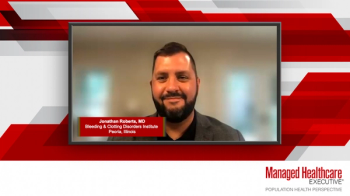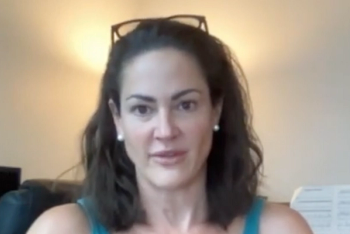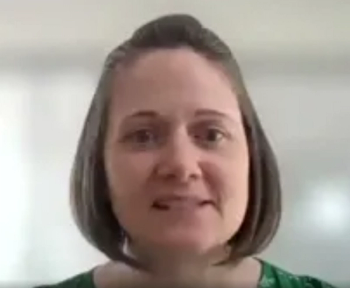
Challenges with biosimilars and unbranded biologics are discussed and how can they be improved.

Challenges with biosimilars and unbranded biologics are discussed and how can they be improved.

Gary M. Owens, M.D., explains how ruxolitinib fits into the treatment pathway for patients with vitiligo from a payer perspective.

Christopher Starr, MD, FACS, highlights ways Demodex blepharitis can impact quality of life for affected patients.

Experts review which patients with vitiligo they would consider using ruxolitinib in.

An overview of how benefit channels, such as pharmacy benefit and medical benefit, differ and how it impacts utilization of biosimilars and unbranded biologics.

Overview of bias toward patients with C. Difficile, plus an overview of commercial insurances vs Medicare in treatment of C. Difficile.

Chesahna Kindred, M.D., MBA, FAAD, and Renata Block, PA-C, describe how ruxolitinib works differently from other topicals traditionally used in the treatment of vitiligo.

Experts review the benefits and side effects of off-label treatments for patients with vitiligo such as corticosteroids, tacrolimus, pimecrolimus or calcipotriene (in combination with corticosteroids).

How an open marketplace impacts future competition, pricing transparency, and formulary management.

As more therapeutic options become available, individualizing treatment for hemophilia A becomes increasingly important.

The potential benefits and uncertainties surrounding gene therapy include its curative potential, the need for immunosuppression, ongoing care needs, and a lack of long-term data.

The evolving hemophilia treatment landscape necessitates informed discussions around patient-centered therapy choices that consider patient lifestyle, treatment goals, and thrombotic risks.

Discussion on cost inputs involved in the cost-efficiency analysis which includes: medication cost, REBYOTA cost, imaging cost, out-patient visit costs, and more.

Goldsack also pointed to Podimetrics and its SmartMat product, which detects the warning signs of diabetic foot ulcers, as a digital health success story: “That is the sort of thing we want to see.”

Experts explain their approach to the treatment of a new patient with vitiligo and the role of phototherapy in their practice.

Chesahna Kindred, M.D., MBA, FAAD, reviews mental health issues that patients with vitiligo are at increased risk for.

Melissa A. Soliz, J.D., of Coppersmith Brockelman PLC is one of 12 winners in this year's Emerging Leaders in Healthcare feature. In an interview with MHE, Soliz recommends the book, “The Immortal Life of Henrietta Lacks” by Rebecca Skloot to those in healthcare because "it is a compelling portrayal of how the law, ethics, ownership and business interests, and health inequities impact patient care and the advancement of that care from a generational perspective."

Savings and incentives associated with the utilization of biosimilars and unbranded biologics, including a look at how it impacts formulary access.

Inhibitor development in hemophilia can drastically impact treatment decisions but their burden can be managed.

Lifelong prophylaxis requires pharmacokinetic profiling, monitoring of factor VIII levels, and adjustments at different stages of life.

Brief rundown of patient demographics involved in REBYOTA trials and this cost-effectiveness analysis.

Sherry Rais, M.Sc., CEO and co-founder, Enthea, is one of 12 winners in this year's Emerging Leaders in Healthcare feature. In an interview with MHE, she recommends "Nickel and Dimed: On (Not) Getting By in America" by Barbara Ehrenreich to not only those in healthcare, but all readers as the book illustrates the ways in which inequality affects people’s access to healthcare.

Jason Prestinario of Particle Health is one of 12 winners in this year's Emerging Leaders in Healthcare feature. In an interview with MHE, Prestinario said sports betting is an interest of his as much of it is built from his background of high school and club college sports, being a fan of competition and even pursuing his career as a data scientist.

Renata Block, PA-C, analyzes a study on how vitiligo affects different socioeconomic groups disproportionately.

Gary M. Owens, M.D., discusses the economic costs associated with vitiligo and the impact this disease has had on the U.S. health care system in general.

Nora Lozano-Evjen of Equality Health, is one of 12 winners in this year's Emerging Leaders in Healthcare feature. In an interview with MHE, Lozano-Evjen shared that after she moved to the United States from Mexico City, she became involved as a prevention specialist for two U.S. school districts, which introduced her to health and social disparities impacting underserved communities — especially those of color. The exposure to these realities pushed her toward the community health worker model she believes in today.

The role of evidence-based recommendations around biosimilars and unbranded biologics to increase patient care, plus how payers and providers evaluate biosimilars through clinical data across multiple indications.

Patients with hemophilia A face challenges with finding a lifestyle-appropriate therapy that considers self-infusion skills, management of breakthrough bleeds, and access to bleeding disorder centers.

Treatment initiation and management of comorbidities pose challenges for both pediatric and older adult patients with hemophilia A.

Overview of Markov model, a tool used for calculating potential clinical outcomes and the associated costs, and its use in the REBYOTA study. The standard of care used in the study is also defined.